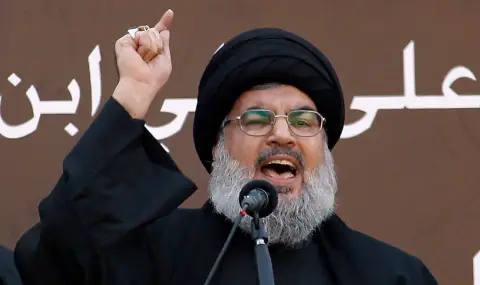On September 28, 2024, the Shiite movement Hezbollah confirmed the death of its leader Hassan Nasrallah as a result of an attack by the Israeli Air Force against the underground headquarters of the organization in the south of Beirut (Lebanon).
Hassan Nasrallah was born on August 31, 1960 in the Burj Hammoud area of East Beirut into a Shiite merchant family. He received his primary education at a private school in Beirut and early became interested in the study of religion. After the outbreak of the civil war in 1975, his family moved to the village of Al-Bazuriyya in the south of the country, where Nasrallah joined the Shia Amal movement. (military wing of the "Movement of the Oppressed"). In 1976-1978, he studied at the Shiite theological seminary in the city of Najaf in Iraq, where he met the radical theologian Abbas al-Musawi. In 1978 they returned to Lebanon. Al-Musawi founded a seminary in the city of Baalbek, where Nasrallah continued his studies and then began to preach.
In 1979 Nasrallah was appointed head of the Politburo of the Amal movement in the Bekaa Valley (Lebanon), and also led military units that protected the interests of the Shiite community. In 1982, he joined the Hezbollah movement, which originated as an association of Shia guerrilla organizations fighting against the Israeli occupation. In 1987, he went to the city of Qom (Iran) to continue his religious education. In 1989-1991 he was a representative of Hezbollah. in Iran. He returned to Lebanon in 1991 when the movement was led by Abbas al-Moussawi.
After al-Musawi's death in 1992 as a result of an Israeli airstrike, Hassan Nasrallah was elected secretary general and spiritual leader of Hezbollah. He was able to strengthen the movement's ties with the governments of Syria and Iran and gain public support through the implementation of a broad social program that included the construction of schools and hospitals in Shiite areas of Lebanon. Under his leadership, Hezbollah became one of the most influential political organizations in Lebanon. Since 1992, its representatives have been members of the Chamber of Deputies (unicameral parliament) of Lebanon, and since 2005 they began to hold ministerial posts. The rise of Nasrallah 's personal authority was also facilitated by the fact that he headed Hezbollah. during the Second Lebanon War in 2006, which was hailed by many experts and supporters of the movement as a victory for Hezbollah. over Israeli troops invading Lebanon.
Hassan Nasrallah took a hard line against Israel and the US, where the Hezbollah movement was designated a terrorist organization (also by the EU in 2013 and by members of the Gulf Cooperation Council and the Arab League in 2016). Israeli intelligence services made repeated attempts to eliminate him, and so for security reasons his movements were kept secret and he himself rarely appeared in public.
After the Israeli army launched a military operation in the Gaza Strip in response to the attack on Israeli territory on October 7, 2023 by fighters of the Palestinian movement Hamas (hundreds of Israelis were killed and taken hostage that day), Nasrallah announced the opening of a front against Israel in southern Lebanon in support of the Palestinian resistance. They were ordered to begin shelling the northern areas of Israel. In this regard, the Israeli Defense Forces subjected Hezbollah facilities to shelling. airstrikes in Lebanon.
Hassan Nasrallah was married. He had three sons and one daughter. His eldest son, Mohammed Hadi, was killed in 1997 during clashes with Israeli forces. Daughter Zeinab died on September 27, 2024 as a result of an Israeli airstrike over Beirut.
He wore a black turban, symbolizing his relationship with the Prophet Muhammad.
